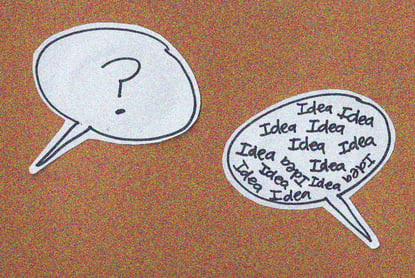If you notice The Brainzooming Group message at the bottom of many marketing strategy posts, we mention helping “smart organizations” with strategic evaluation and differentiation strategy development. This phrase is shorthand for how I usually describe our target strategic planning clients: “organizations almost too smart for their own good.”
While that might sound flippant, it’s not.
 How Can an Organization Be Too Smart for Strategic Planning?
How Can an Organization Be Too Smart for Strategic Planning?
Being “too smart” for strategic planning happens when an organizations becomes TOO expert at:
- Following a differentiation strategy that's worked well for a long time but is showing early signs of age
- The structure of their markets and what creates conventional marketing strategy success
- Their own perceptions of current and future customer needs
- What they can potentially to do to satisfy customer expectations
When an organization becomes THAT smart, it’s typically because its marketing strategy has been very successful and its market and organization relatively stable. These are the good aspects of being too smart about your organization.
The bad aspect of being too smart means prolonged success and stability can lead to indifference, arrogance, and a lack of solid customer analysis, thorough strategic evaluation, and effective strategic planning to push the organization for future-oriented disruptive innovation.
What to Watch for When Organizations Become Too Smart
There are multiple ways organizations manifest being too smart and losing the drive for disruptive innovation. Based on our collective experience at The Brainzooming Group, here are five signals an organization may be too smart for its own good relative to strategic planning:
- There is a very stable leadership team with few new members from outside the organization (or industry) in at least ten years.
- The organization is very stable with new people at junior levels whose challenging ideas are being stifled by senior leader resistance.
- It’s a market leader with strong share and financials who hasn’t faced serious competitive threats to its marketing strategy for as long as anyone can remember.
- It’s a smaller player in a large market that’s been able to be comfortable with its size and share position.
- A company that’s been protected from aggressive competition by a structural advantage (whether regulatory, economic, environmental, etc.) that’s disappearing.
In any of these situations, waiting around for disruptive innovation to happen instead of creating a new differentiation strategy to create beneficial change can be a crippling mistake.
How a Strategic Evaluation Makes a Difference
In these situations, organizations need to be pushed to look at their familiar situations in new, and even strategically frightening ways through a dynamic strategic evaluation. This can entail:
- Considering a new differentiation strategy before the current marketing strategy quits working
- Conducting an insight-driven customer analysis to identify unforeseen customer needs
- Identifying future competitors not yet apparent on the horizon
- Evaluating disruptive innovation opportunities with an eye toward future success
The irony is through challenging a “too smart” organization with an aggressive strategic evaluation, it will actually get smarter and savvier as it develops a relevant differentiation strategy for the future.
If your organization feels like it’s too smart for its own good and may be losing disruptive innovation opportunities as a result of a too conventional differentiation strategy, contact us.
At The Brainzooming Group, we’re experts at helping smart organizations develop the right marketing strategy based on a rigorous, yet brisk customer analysis and strategic evaluation to get smarter, better, and more successful – in a hurry. – Mike Brown
If you enjoyed this article, subscribe to the free Brainzooming blog email updates.
The Brainzooming Group helps make smart organizations more successful by rapidly expanding their strategic options and creating innovative plans they can efficiently implement. Email us at info@brainzooming.com or call us at 816-509-5320 to learn how we can help you enhance your strategy and implementation efforts.



